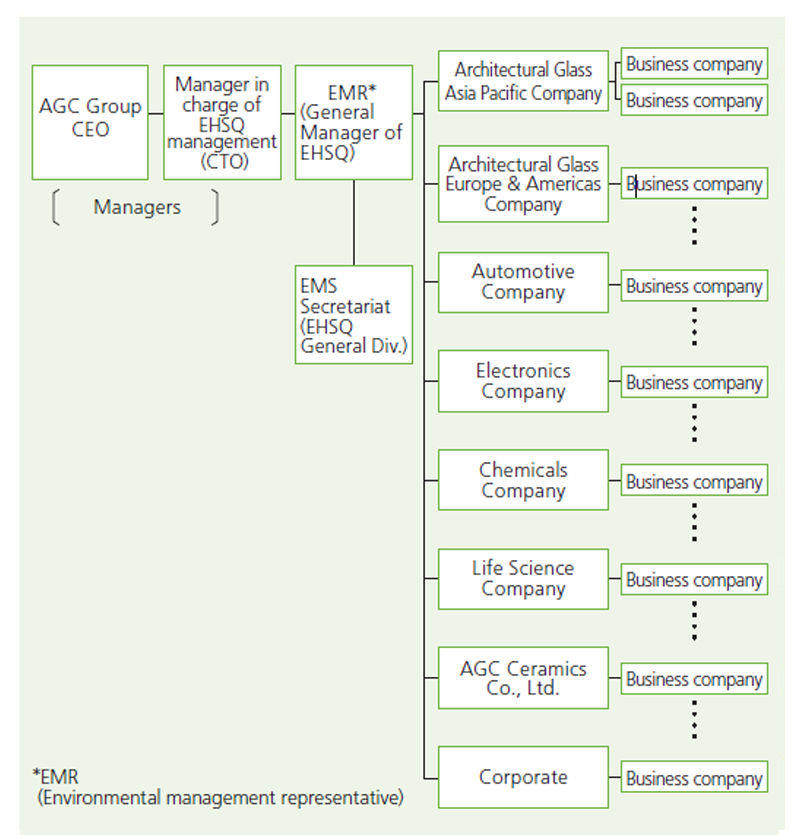Environment Management
Fundamental Approach
To promote sustainability management across the entire AGC Group, while ensuring compliance with laws and regulations at all our sites, we established the AGC Group EHSQ policy in 2023 and revised the AGC Group Environment policy. By reducing the environmental impact throughout the entire value chain from raw material procurement to the use and disposal of products, we will contribute to the sustainability of the planet on which all life depends, while continuing to grow and evolve ourselves.
Management Structure
Governance and oversight centered on the Board of Directors
AGC Group positions climate change as a material issue affecting corporate value and has established an oversight framework centered on the Board of Directors. Climate-related assessments and policies are reported twice a year and reviewed in connection with strategic decision-making. The outcomes of committee and meeting deliberations are reflected in management decisions, helping to translate climate action into a source of competitive advantage.
Role of senior management and executive bodies
- Sustainability Committee
The Sustainability Committee is the highest decision-making body responsible for addressing climate-related risks and opportunities. Chaired by the CEO, the committee meets four times a year and is attended by the CFO, CTO, Audit & Supervisory Board members, and heads of key business divisions. The committee deliberates on policies and targets, monitors progress, and conducts scenario analysis. It reports to the Board of Directors at least twice a year, serving as a bridge between management and environmental strategy. - We have established the AGC Group EHS Committee as a forum for discussing and deliberating on environmental issues related to stable business operations, such as compliance with environment-related laws and regulations, based on the decisions and reports of the Sustainability Committee. The AGC Group EHS Committee is held four times a year, chaired by the executive officer in charge of environmental matters (EHSQ General Div.) based on the AGC Group EHS Committee Criteria, and is attended by the general managers in charge of environmental activities at in-house companies and strategic business units (SBUs) and employees in charge of such activities at corporate divisions.
- Environmental Response Meeting
The Environmental Response Meeting is an operational body responsible for analyzing environmental issues and implementing initiatives, in line with the direction set by the Sustainability Committee. Led by the responsible executive, the meeting involves participation from both business units and corporate functions. Through eight meetings per year and thematic projects, it advances risk responses and provides recommendations to senior management as needed.

Implementation of the environmental management system
The AGC Group, which has nearly 200 Group companies globally, has established a system based on an environmental management system to ensure that appropriate activities are carried out at all of its bases around the world.
Approach to Environmental Activities
The AGC Group requires that all facilities of a certain size or larger obtain certification for environmental management system standards such as ISO 14001, or implement environmental activities in accordance with such standards. Under the ‘AGC Group Environmental Management Working rules,’ all sites are assigned one of three ‘environmental activity levels’ based on their environmental impact, and are required to implement environmental activities appropriate to their category. Regardless of the category (1, 2, or 3), compliance with legal requirements, dissemination, compliance with the ‘AGC Group Environment Policy,’ and adherence to various standards within the AGC Group are designated as mandatory activities. The compliance status of these activities is subject to regular monitoring.
- Category 1: Sites with high-environmental risks. ISO 14001 certification is mandatory.
- Category 2: Small-scale manufacturing sites without glass melting furnaces or exhaust gas treatment facilities, recognized as having moderate risk. While obtaining certification is not mandatory, activities compliant with ISO 14001 and the recording of environmental performance data are required.
- Category 3: Low-risk facilities such as sales offices. Reporting environmental incidents to headquarters is a mandatory activity
Management Structure


